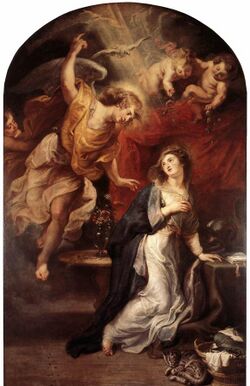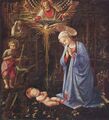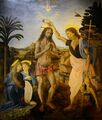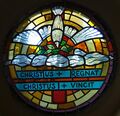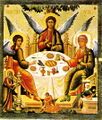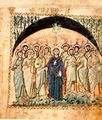Religion:Holy Spirit in Christian art
The Holy Spirit has been represented in Christian art both in the Eastern and Western Churches using a variety of depictions.[1][2][3]
The depictions have ranged from nearly identical figures that represent the three persons of the Holy Trinity from a dove to a flame.[4]
The Holy Spirit is often depicted as a dove, based on the account of the Holy Spirit descending like a dove on Jesus at his baptism.[5] In many paintings of the Annunciation, the Holy Spirit is shown in the form of a dove, coming down towards Mary on beams of light, as the Archangel Gabriel announces Christ's coming to Mary.
A dove may also be seen at the ear of Saint Gregory the Great─as recorded by his secretary or other church father authors, dictating their works to them.
The dove also parallels the one that brought the olive branch to Noah after the deluge, as a symbol of peace.[5]
The book of Acts describes the Holy Spirit descending on the apostles at Pentecost in the form of a wind and tongues of fire resting over the apostles' heads. Based on the imagery in that account, the Holy Spirit is sometimes symbolized by a flame.[4]
There are also depictions of the Holy Spirit in the book of Genesis. In The Vatican Museum in Rome is a carved stone sarcophagus depicting the Holy Trinity as three bearded men during the creation of Eve.[6] The majority of early Christian art depicts The Holy Spirit in an anthropomorphic form as a human with two other Identical human figures representing God the Father and Jesus Christ. They either sit or they stand grouped closely together. This is used to portray the unity of The Godhead.[7][8]
The Holy Spirit is represented in various artistic mediums such as stained glass windows and calligraphy.[9]
Gallery
Baptism of Christ by Pietro Perugino, circa 1498
In the Trinity
Pentecost
See also
- God the Father in Western art
- Trinity in Christian art
Notes
- ↑ Renaissance art: a topical dictionary by Irene Earls 1987 ISBN:0-313-24658-0 page 70
- ↑ Gardner's art through the ages: the western perspective by Fred S. Kleiner ISBN:0-495-57355-8 page 349
- ↑ Vladimir Lossky, 1999 The Meaning of Icons ISBN:0-913836-99-0 page 17
- ↑ 4.0 4.1 The Holy Spirit: Classic and Contemporary Readings by Eugene F. Rogers Jr. (May 19, 2009) Wiley ISBN:1405136235 pages 121-123
- ↑ 5.0 5.1 We Believe in the Holy Spirit (Ancient Christian Doctrine, No. 4) by Joel C. Elowsky (Jul 13, 2009) InterVarsity ISBN:0830825347 page 14
- ↑ Early christian art and architecture by Milburn, R., & Milburn, R. L. P. (1988) Los Angeles: University of California Press. ISBN:0520063260 page 68
- ↑ Three Drawing in an Anglo-Saxon Pontifical: Anthropomorphic Trinity of Threefold Christ? by Rosenthal, J. E. (1981) Art Bulletin, 63(4), ISSN 0004-3079 page 546
- ↑ The Trinity. Touchstone: A Journal Of Mere Christianity by Rublev, A. (2013) Academic Search Complete ISSN 0897-327X page 54-55
- ↑ Christian Century by Huey-Heck, L. (2012)Academic Search Complete ISSN 0009-5281 page 47
External links
- Age of spirituality : late antique and early Christian art, third to seventh century from The Metropolitan Museum of Art
 |
